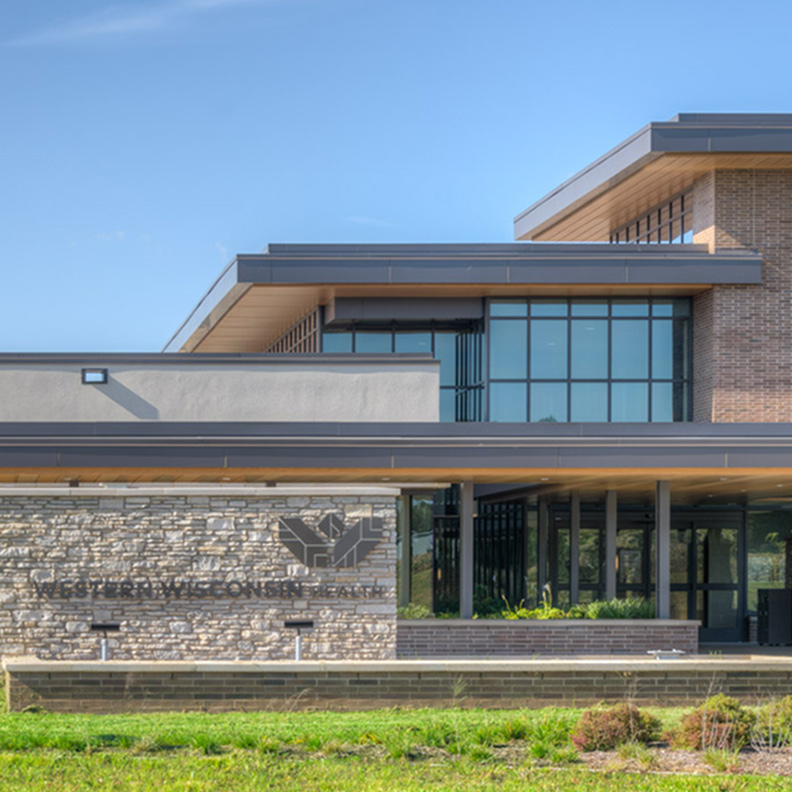Western Wisconsin Health CEO Alison Page believes everyone can live well – no matter the size of the community they live in or their household income. And she’s been proving this theory every day for the past eleven years through her efforts – first to build and then to lead the state-of-the-art, LEED-certified healthcare facility in Baldwin, WI, a town of fewer than 4,000.
At the northwest corner of the I-94 and Highway 63 interchange sits an attractive, Prairie-style building with vaulted ceilings, ample windows and clean, modern furnishings. Western Wisconsin Health offers comprehensive health and wellness services, including preventive care, behavioral health, primary care, emergency care, advanced surgical procedures, integrative health, orthopedic services, rehabilitation services, women’s health, and treatment for a broad range of medical conditions.
The facility replaced the Baldwin hospital, which had served the residents of Baldwin and surrounding communities since it opened in 1936. Earning a spot on the “Top 100 Hospitals in the Nation” list twice, the Baldwin hospital was a point of pride for the local community, but it was also an older facility in need of updating. The idea of tearing it down to build a new health and wellness center in a different location wasn’t necessarily a popular idea at the start.
To engage the community and gain buy-in for the new facility, Page and her team held a number of open houses where she shared the vision for the new center. She partnered with community stakeholders in selecting the location for the new building. “It was really important to involve the community and give them a chance to weigh in; it was their hospital,” Page said.
Bremer, their financial partner since 2011, provided the construction loan for the new facility, designated as a critical access hospital (CAH), a label given to eligible rural hospitals by the Centers for Medicare and Medicaid Services (CMS). The purpose of the CAH designation is to reduce the financial vulnerability of rural hospitals and improve access to healthcare by keeping essential services in rural communities.
“It was a complex financial undertaking,” Page explained. “The facility was funded by the USDA, which requires the involvement of a local funder. We appreciated that Bremer was willing to work with a smaller player like us and devote time and energy to learning about our local community. To us, Bremer feels like a small-town friend. They always have our back.”
Page advocates for a holistic approach to health that focuses upstream with an emphasis on preventing illness instead of paying for high-end medical care. “The fitness center in our building is a benefit to the community, not a moneymaker,” she said.
And patients won’t find a can of soda anywhere in Western Wisconsin Health. Instead, they’ll find a café with healthy food at low prices and vending machines stocked with healthy beverages and snacks – all open to the public.
This approach to holistic wellness extends to the facility itself. Page was adamant about using sustainable materials and practices in the new building, which was LEED certified Silver in 2019. “Sustainability is the right thing to do, especially if we have the means and ability to build sustainably,” Page said.
Page underscores the importance of communication and team engagement as a CEO. “Stuff doesn’t happen by accident. You have to help employees understand where we are headed and why, and help them see their role in achieving the vision,” she said. She suggests one-on-one conversations as a great way to introduce, explain and connect people to the vision.
There’s likely to be quite a few of those conversations in the future because Page and her team are full of ideas for promoting health and wellness and producing better health outcomes for patients. With a motto of, “Be bold and mighty forces will come your way,” Page and her team are steering Western Wisconsin Health to be a mighty force for wellness in Wisconsin.
